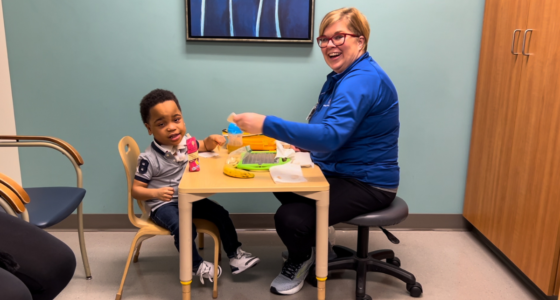
There are two main types of speech and language disorders your child may be experiencing. One type is when they have difficulty making correct speech sounds. The other type is when they have difficulty using and understanding language.
The two common disorders of speech and language are speech sound (articulation) disorder and mixed receptive-expressive language disorder. These disorders are very different from each other in the symptoms they cause and how they are treated.
A speech-sound (articulation) disorder describes when a child says sounds and words incorrectly, even though they are past the expected age to be able to do this. Speech-sound disorder is also called articulation disorder. A child with a speech sound disorder may:
- Substitute one sound for another
- Leave sounds out of words
- Add sounds to words
- Change a sound in a word
A mixed receptive-expressive language disorder is when a child has difficulty in both speaking and understanding others. A child with mixed receptive-expressive language disorder may have trouble:
- Following directions
- Understanding what people say to them
- Answering yes/no questions correctly and answering “WH- questions” correctly (“who,” “what,” “where,” “when,” “why,” “which,” “whose” and “how”)
- Using grammatically correct sentences, such as using the correct verb tense (“I go” versus “I goes”)
- Telling a clear, organized story
- Using an age-appropriate vocabulary
Assessment
A speech-language pathologist has several tools to evaluate your child’s speech and language skills. They include the following:
- A detailed history from the child’s family to learn how the child has developed over time and any current communication challenges.
- Standardized assessments to compare your child’s performance to same-aged children who are developing typically. The SLP may ask your child to name pictures and repeat sentences to listen to the way your child produces sounds in single words and sentences. They may also look at similar parts of language, such as following directions, grammar, vocabulary and figurative language.
- An oral mechanism exam, which looks at the way the muscles are working in and around your child’s mouth. This exam helps rule out muscle weakness or physical abnormalities that may be contributing to your child’s challenges with making sounds.
- A language sample, which involves listening to the child speak in natural way. For example, a child may tell a story from a wordless picture book or play with toys with the provider. The SLP writes down what the child says and reviews it to evaluate things such as the words the child uses (vocabulary), grammar and sentence length.
As you investigate your child’s speech challenges, it’s important to have your child’s hearing examined. Hearing loss can lead to speech sound errors when your child cannot hear the correct sounds of speech.
Treatments
Treatments
- Speech and language therapy. If your child has trouble communicating with others, a speech pathologist will work with them to improve communication skills. Speech therapists also work on the social aspects of communication, such as back-and forth conversation, and nonverbal communication, like eye contact.
- Augmentative and alternative communication (AAC) device. Augmentative and alternative communication (AAC) describes a form of communication other than talking. This often includes using gestures, like sign language, or using an app on a device like a tablet or iPad. Some children with spoken language disorders benefit from this approach. It is important to remember that AAC does not discourage spoken language – it’s only been proven to help language growth.
Support Services & Resources
Support Services & Resources
Visit the trusted websites below for more information and support for voice and speech conditions.
We offer a broad range of supportive services to make life better for families who choose us for their children's care.
The American Speech-Language-Hearing Association (ASHA) offers information and resources on spoken language disorders.
ASHA also offers information on AAC systems.
Download this guide from Riley Children's to learn how mixed receptive-expressive language disorder can affect how kids understand and use words—and how speech therapy can help.
ကလေးများ၏ စကားနားလည်မှုနှင့် အသုံးပြုမှုအပေါ် သက်ရောက်မှုရှိသော စကားပြောနားလည်မှုရောနှောမှုရှိသောရောဂါအကြောင်းနှင့် စကားပြောကုသမှုက ဘယ်လိုကူညီနိုင်သည်ကို သိရှိရန် Riley Children's မှ ထုတ်ဝေသော ဤအကြောင်းအရာတိုတောင်းသောလမ်းညွှန်ကို ဒေါင်းလုပ်လုပ်ပါ။
Telechaje gid sa a soti nan Riley Children's pou w aprann kijan dezòd langaj reseptif-ekspresif ka afekte fason timoun yo konprann ak itilize mo—epi kijan terapi lapawòl ka ede.
Descargue esta guía rápida de Riley Children's para conocer cómo los trastornos del lenguaje receptivo-expresivo afectan la forma en que los niños entienden y usan las palabras, y cómo la terapia del habla puede ayudar.
Download this guide from Riley Children's to learn what speech sound disorders are and how speech therapy can help. It also includes tips for families to support speech at home.
စကားပြောသံချို့ယွင်းမှုများနှင့် စကားပြောကုထုံးက မည်သို့ကူညီပေးနိုင်ကြောင်း လေ့လာရန် Riley Children's မှ ဤအမြန်လမ်းညွှန်ကို ဒေါင်းလုဒ်လုပ်ပါ။ အိမ်တွင် စကားပြောဆိုရန် မိသားစုများအတွက် အကြံပြုချက်များလည်း ပါဝင်သည်။
Telechaje gid sa a soti nan Riley Children's pou w aprann sou dezòd son nan pale ak kijan terapi lapawòl ka ede. Li gen konsèy pou fanmi yo ede timoun yo devlope pale lakay yo.
Descargue esta guía rápida de Riley Children's para conocer qué son los trastornos del habla y cómo la terapia del habla puede ayudar. También incluye consejos para que las familias apoyen el desarrollo del habla en casa.
Departments Treating This Condition
Departments Treating This Condition
Related Stories
Related Stories

Speech-language pathologist helps children with feeding problems
Tara Quirke, a speech-language pathologist at IU Health North, has worked at the hospital since it opened. She works with pediatric patients, from newborns to teenagers. Her focus areas are feeding...
Continue reading
